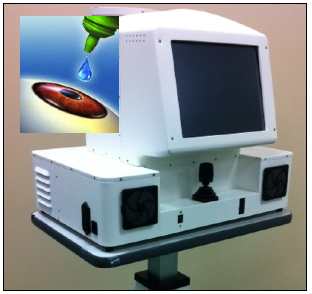
Acton, Mass.-based Cognoptix (formerly Neuroptix) has developed an entirely novel, early-stage diagnostic for Alzheimer’s disease (AD) to allow treatment before significant neuronal loss and irreversible brain damage occurs.
“There is an urgent need for a quick, predictive, reliable, cost-effective and widely available test for early diagnosis and treatment of Alzheimer’s disease,” said P. Murali Doraiswamy, M.D., Professor of Psychiatry and Geriatrics, Duke University Medical Center; Member, Duke Institute for Brain Sciences; and Member, Cognoptix Clinical Advisory Board.
“Currently there is no early-stage non-invasive diagnostic for Alzheimer’s disease in the market,” said Paul Hartung, President and CEO of Cognoptix. “Unfortunately, patients often incur up to 50% neuronal loss and a delay of up to two years before demonstrating severe enough symptoms to achieve diagnosis by the current gold standard: a ‘process of elimination’ of other possible diagnoses such as stroke, trauma, Parkinson’s disease, dementia, etc., through extensive cognitive and physical testing. New therapeutic drugs to slow or stop the progress of AD are expected to reach the market soon. Cognoptix is developing a method of early-stage diagnosis to allow treatment before significant neuronal loss and irreversible brain damage occurs.”
Last week, Cognoptix announced that it has exclusively licensed groundbreaking technology from the University of California at San Diego (“UC San Diego”), which Cognoptix has developed into an innovative, noninvasive eye-scanning test for the early detection and diagnosis of Alzheimer’s disease (“AD”). The UC San Diego technology is the subject of a scientific paper recently published in the peer-reviewed Journal of the American Chemical Society (“Aminonaphthalene 2-Cyanoacrylate [ANCA] Probes Fluorescently Discriminate between Amyloid-β and Prion Plaques in Brain”).
The Cognoptix SAPPHIRE II system consists of a laser-based reading device and consumable ophthalmic ointment. The eye exam can be given by a general practitioner and only takes a few minutes to achieve a result. The Cognoptix drug/device combination is an entirely novel, early-stage diagnostic for Alzheimer’s disease designed to allow treatment before significant neuronal loss and irreversible brain damage occurs.
Cognoptix has a strong and comprehensive patent portfolio covering diagnosis of beta amyloid-based diseases via ophthalmic imaging. The patent portfolio includes issued “method” and “device” patents, as well as pending “composition of matter” patents. In addition to UC San Diego, exclusive licenses have been acquired from Massachusetts General Hospital and Brigham and Women’s Hospital Boston.
There are more than 100 new Alzheimer’s drugs that are in various stages of research and development. The ability of the Cognoptix drug/device combination to easily identify and qualify patients for clinical study inclusion, as well as accurately and inexpensively track patient disease progression, may provide pharmaceutical companies with a significant competitive advantage in securing new Alzheimer’s drug approvals. It may also help identify and document differentiating pharmaceutical product performance attributes in Phase 4 studies.
The current Alzheimer’s pharmaceutical market is estimated at well over $8 Billion and, due to the aging population, is growing rapidly. Earlier diagnosis of AD will enable earlier pharmaceutical intervention and drug titration, which will not only significantly increase the treatable AD patient base but also will provide for superior therapeutic outcomes, improving patients’ lives and lowering the overall long-term cost of patient care.